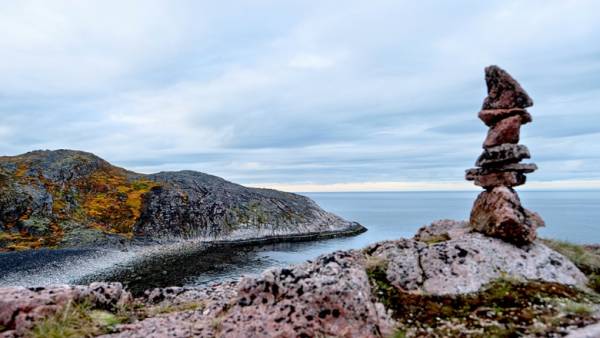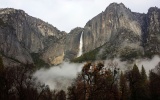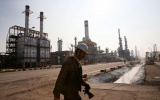Records of the Arctic: in the Arctic unprecedented warming
The temperature increased by more than 3 degrees.
Upstairs
The average annual temperature in the Arctic zone of Russia was higher than the rate for 3,23°C at the end of last year, according to data from the Ministry of environment. This is a record warming in the twenty-first century. It will continue in the future, ascertain in the Ministry. This could have serious consequences, both biological and economic, experts say. For example, if the end of the century the Arctic ocean is almost free from ice, the transportation of goods will become much faster and cheaper, but the regions on the ocean will be flooded.
Record warming in the Arctic zone of Russia in 2017, said in the draft report is of great status and environmental protection in 2017, which acquainted “Izvestia”. In addition, in 2017 in the Russian Arctic, the amount of precipitation exceeded the multiyear average by 13%, indicated in the report. Maximum separation from the norm was recorded in the Eastern sector (the territory of Yakutia and Chukotka): there, the average temperature exceeded the norm by 4.07°C.

In the report the Ministry of environment noted that the Eastern sector was the warmest in all seasons. Summer record seasonal temperature observed in the European sector. Overall, of the seasons all across the Arctic warmest in the last year it was spring.
The news Fossil energy resources must leave in the past
Fossil energy resources must leave in the past
The Russian Arctic zone are fully included Murmansk oblast, Nenets Autonomous Okrug, Chukotka, the Yamalo-Nenets Autonomous Okrug. Partly this zone includes the territory of the Arkhangelsk region, Karelia Republic, Komi Republic, Krasnoyarsk Krai, Yakutia, and the island located in the Arctic ocean.
The incident increase in temperature can be considered critical, told “Izvestia” in the Ministry. This leads to melting of permafrost, resulting in destruction of infrastructure (the effect on the bearing capacity of pile foundations), transportation risks (the destruction of linear objects) and a reduction in the duration of operation of winter roads along the rivers, said the Agency. In addition, changes in temperature and wind regime affects the growth of wind speed, which is especially dangerous for drilling rigs offshore in the Arctic, told in the press service of the Ministry.

As noted in the report, the increase in the average temperature observed in the Arctic since the 1970’s and accelerated sharply in the twenty-first century. The forecast of the Ministry of natural resources disappointing: warming will continue, and with what intensity depends on “future greenhouse gas concentrations and other anthropogenic impacts”. Heavy precipitation in the Russian Arctic will continue, as changes in the level of snow, ice and permafrost.
News Death from the heat: as temperatures will destroy people
Death from the heat: as temperatures will destroy people
Global warming is a term widely known, but in different areas the temperature rises with different intensity, explained the scientific Director of the hydrometeorological center of Russia Roman Vilfand. For example, at Equatorial latitudes the temperature rises not so much as in this area a lot of water (oceans), which cools the air. But in the Arctic, especially the Russian, the annual average temperature increased about three times faster than in the southern latitudes, said the expert.
According to him, at this rate, by the end of this century the Arctic ocean completely free of ice in summer. This will open up new economic opportunities — in particular, the trafficking of cargo from Asia via the Arctic ocean will be much faster than the South. But at the same time, there will be negative consequences: many regions on the ocean flood, added the expert.

Further warming in the Arctic zone of Russia, which including the Arctic ocean might melt, indeed inevitable, and this will be particularly noticeable in the Siberian area, said the lead meteorologist “Gismeteo” Leonid Starkov. He also said that increased rainfall in this case, the natural phenomenon is more noticeable than the temperature, the more moisture it will contain the atmosphere.
News Energy war. As there is increasing competition for influence in the oil producing regions
Energy war. As there is increasing competition for influence in the oil producing regions
A significant part of international research confirms global warming. Even if will soon follow the cold, to live “in heat” to the next 30-50 or even 100 years, the Director of the Institute of ecology of the HSE Boris Morgunov. The expert also confirmed that the warming of the Russian Arctic does carry big risks for infrastructure built on permafrost.
The experts also noted that the state now pays special attention to environmental protection in the Arctic zone. As noted in the report of the Ministry, one of the main goals of state policy is to “preserve and protect the natural environment of the Arctic, liquidation of ecological consequences of economic activity in terms of increasing economic activity and global climate change”. The main measures for ensuring environmental security in the Arctic zone, the Ministry of environment include the establishment of special regimes of nature management and environmental protection, disposal of toxic industrial waste, chemical safety.